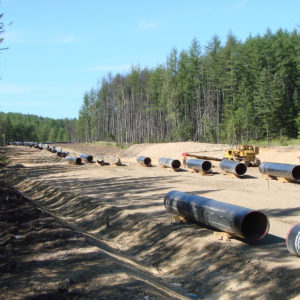Only a few months ago, InsideSources reported that a federal program meant to help safely upgrade the nation’s energy infrastructure was actually steering money to environmental groups bent on defeating energy projects, a revelation that triggered a backlash from lawmakers in Congress who demanded a review of the program’s grant-making procedures.
Now, with a growing chorus of protests from labor and industry over stalled projects, federal investigators appear to have quietly opened an inquiry into the questions that have been raised, injecting new uncertainty for the controversial program, known as the Pipeline and Hazardous Materials Safety Administration’s Technical Assistance Grants (TAG) program.
The audit by the Inspector General was not publicly announced. Rather, it is outlined in a brief passage buried in voluminous legislation that Congress recently enacted providing $517 million to the agency overseeing the program over the next four years. Roughly a fifth of the agency’s funding is earmarked for grants like those awarded through the TAG program.
Now, the TAG program appears to be in a bureaucratic limbo, with no record of grants awarded to outside groups, at a time when an surge in gas exploration has spurred a flurry of pipeline projects in communities around the country, including in Pennsylvania, Iowa, North Dakota, and South Dakota. It is not unusual for federal programs to be suspended during the course of an inquiry by an Inspector General.
The inquiry’s areas of focus, detailed in the reauthorization act, underscore the growing concerns with a program that has doled out grants totaling nearly $10 million in recent years, including to environmental groups whose aim, critics say, has often been to block new energy projects, instead of partnering with industry to ensure their safe completion, as the program requires.
The audit seeks a list of all grant recipients during a five-year period from 2010 to 2015; a detailed accounting of how the grant money was actually spent; an analysis determining whether grant expenditures complied with the terms of grant agreements; an evaluation of the process used to determine grant recipients; and an evaluation of PHMSA’s ability to adequately monitor the program and grant expenditures.
The TAG program was created by Congress in 2009 to allow PHMSA, part of the U.S. Department of Transportation (DOT), to award grants to non-profits and local governments to “improve damage prevention, develop new technologies, or otherwise improve pipeline safety” of natural gas or hazardous liquid pipelines.
The audit by the Inspector General comes several months after an investigation by InsideSources uncovered a pattern showing that a striking number of TAG grants have gone to environmental groups that have supported lobbying campaigns against pipeline construction projects across the country.
No reason for the inquiry is offered in the legislation. But during hearings last fall over new funding for the program, PHMSA officials drew criticism for awarding money to environmental groups with a record of almost categorical opposition to energy projects.
Critics say that the disbursement of grants to anti-pipeline groups appears to run contrary to how the law says the grants may be used – though PHMSA and some of the grant recipients have defended the disbursements as appropriate. The regulations that authorize the program state that funds “may not be used for lobbying, for direct advocacy for or against a pipeline construction or expansion project, or in direct support of litigation.”
Among the questionable recipients was the Pipeline Safety Coalition, a group that says on its website that it has received TAG grants or participated in projects that have received TAG grants totaling at least $1.1 million. The coalition, founded by Lynda Farrell, has filed comments against major pipeline projects across Pennsylvania and partnered with activist groups, such as the Clean Air Council and the Delaware Riverkeeper Network, that continually wage battles against energy infrastructure projects as part of their core mission.
In this instance, the circumstances surrounding the grant appear to raise more questions. While grant recipients are expected to issue reports to PHMSA on how the funds are used, the nonprofit appears to have failed to file required disclosure reports with the Internal Revenue Service with one exception. That was a so-called postcard filing for 2013 that contained little information about the organization’s finances and activities.
PHMSA also pumped $283,850 to the Mayors’ Council on Pipeline Safety (MCPS) that Farrell helps lead. The group represents mayors, elected officials, fire chiefs, first responders and government and non-government organizations. MCPS was founded in 2012 following pipeline accidents in San Bruno, California and Allentown, Pennsylvania.
But the circumstances around that award raise a number of questions. The organization has also failed to file required disclosure reports with the Internal Revenue Service. Additionally, one of the leaders of the organization, Allentown Mayor Ed Pawlowski, is under federal investigation for the improper use of public funds. MCPS did not respond to an inquiry regarding Pawlowski’s involvement and the accounting of those funds. PHMSA did not respond to an inquiry of whether they were aware of the federal investigation into Pawlowski.
PHMSA officials acknowledged they are aware of the language in the legislation requiring an audit, but the agency declined to respond to a number of questions about the audit. They would not say whether the congressionally-mandated inquiry suggested the agency had run afoul of internal rules by funding activist groups opposed to energy projects; whether any recommendations resulting from the inquiry are binding and can lead to an overhaul or permanent suspension of the program; and whether the program continues to operate and provide grants during the course of the IG’s work.
The prospect that the TAG program will resume with few, if any, changes is prompting concern among industry representatives and labor leaders who point to past grant beneficiaries, like the Clean Air Council in Pennsylvania, as prime examples of the unintended consequences of the program. The group received $50,000 to study pipeline safety technologies, at the very same time it was preparing to enter into litigation against energy companies in Pennsylvania.

